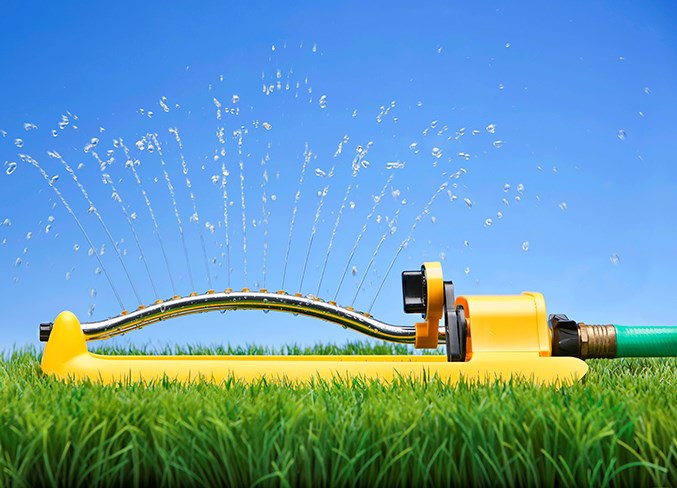The grass isn't always greener in the hot, dry summer months. With temperatures increasing due to climate change, perhaps it's time to rethink lawn care.
Keeping lawns and gardens green is one reason water use nearly doubles this time of year.
York Region has imposed outdoor water use limitations to prevent water shortages, enforced through water use bylaws in each of the municipalities.
A steady water supply ensures drinking water reserves, adequate water pressure, and vital fire protection.
There is also an environmental benefit to reduced outdoor water use. Unfortunately, runoff from sprinklers and hoses can pick up pollutants as it enters storm sewers. This water flows untreated into Lake Ontario, harming our drinking water source and the home of thousands of plant and animal species.
{In Newmarket, watering of residential lawns, gardens, trees, and shrubs is permitted from 6 and 10 a.m, and 6 to 10 p.m. Properties with even-numbered street addresses may water on even-numbered dates and those with odd-numbered addresses on odd-numbered dates, with a one-month grace period for new sod and seed. Although York Region’s bylaw runs from May 15 to Sept. 30, Newmarket’s bylaw is year-round.}
It's possible to prepare your lawn to withstand the hot, dry weather without excessive water use. The city's website suggests aeration, top-dressing with compost, overseeding, increasing the lawnmower blade height, and fertilizing achieve various benefits. Among them are improved water absorption, weed and disease minimization, improved nutrition, and the establishment of robust root systems.
Gloria Marsh, executive director of the York Region Environmental Alliance (YREA), sees the matter from a different perspective. She urges homeowners to consider a move to "decolonize the cookie cutter lawns because it has absolutely no benefit to anything or anybody."
YREA recognizes that a shift in thinking from the need and desire to have a high-maintenance "monoculture" lawn requires education, sharing of information, and time. The organization encourages homeowners to consider growing a drought-friendly, low-maintenance pollinator meadow instead. By taking a non-intervention approach, shares Marsh, the area will naturalize and become a place for birds, bees, and butterflies to enjoy, rather than a "vast, useless lawn."
If you prefer a conventional lawn, YREA offers some constructive suggestions. Grass turning brown from heat stress in the summer doesn't mean it's dead – it's dormant and will rejuvenate in the cooler, damper fall weather. One inch of watering per week is all that's necessary. And when cutting, leave the clippings as it nourishes the lawn with extra nitrogen.
YREA also suggests mixing clover seed into the grass seed mix when overseeding. It's a pollinator-friendly option that adds one-third of the nitrogen needed for a strong and healthy lawn. Plus, it's far more drought-resistant and stays green even when the grass turns brown. A grass seed mix that contains little or no Kentucky bluegrass seed is another benefit since Kentucky bluegrass has a shallow root system that is less drought-tolerant and more attractive to grubs.
Marsh credits the City of Markham as one of the first municipalities to adopt lawn pesticide restrictions. Allowing unused municipal parkland and greenspaces to naturalize is another step her organization sees happening that they applaud for its environmental benefits.
She points out, however, that an adjustment to property standards by-laws is necessary to allow more flexibility for pollinator meadows in place of lawns. Current property standards by-law 2017-27 S.4 limits "ground cover" (such as grass) height to six inches but does not restrict the height of "natural gardens," defined as "area of vegetation that has been deliberately planted or cultivated." Given that pollinator meadows are naturally occurring and not deliberately planted, YREA is urging the city to include them as natural gardens to give homeowners a broad range of options.
Visit yrea.org/campaigns/organic-lawn-care/ for information.
Jennifer McLaughlin is a federally funded Local Journalism Initiative reporter at Markham Review



